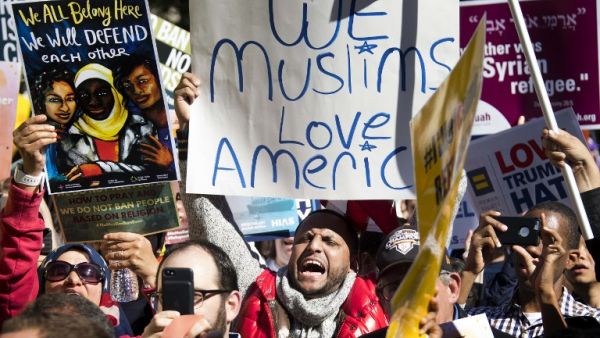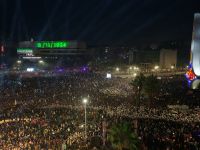Just as a travel ban targeting six majority-Muslim nations was allowed to come into force by the U.S. Supreme Court, news emerged that police had foiled a planned mass shooting targeting a mosque.
For many, the juxtaposition of the two events served to emphasise how misplaced U.S. President Trump’s supposed efforts to protect national security actually are.
I still can’t get over this.
— Jeremy Old Saint Nicklellan (@JeremyMcLellan) December 5, 2017
A Christian man in Florida was caught planning to massacre Muslims by climbing to the top of their mosque’s minaret and gunning them down during Friday prayer.
A terrorist attack was prevented.
No tweets from Trump.
No ban on Christians.
Branded as the “Muslim ban”, Trump’s administration has branded its suspension on visas from Chad, Iran, Libya, Somalia, Syria and Yemen as an effort to counter terrorism.
Yet, research by the Cato institute has found that “no terrorist from” the majority-Muslim nations banned “has carried out a lethal attack in the United States.”
“Indeed, no Libyans or Syrians have even been convicted for planning such an attack… This discrimination is arbitrary and cannot be rationally justified based on a assessment of the risk.”
Since 9/11, more than 700,000 refugees have come to the U.S. None have killed anyone in acts of domestic terrorism. In the past 40 years, no individual from the #muslimban's Muslim majority countries has killed anyone in an act of domestic terrorism. Why is this ban necessary?
— Wajahat Ali (@WajahatAli) December 4, 2017
Although, as Snopes pointed out in February, that does not mean they have not been implicated in non-lethal terrorist activities, it goes some way to challenging the shaky justification of the ban.
Trump has justified his ban by saying that the “vast majority” of people convicted of terrorism-related offenses since 9/11 “came here from outside of our country.”
This is an assertion challenged by leading terrorism experts.
Think-tank New America has found that 84% of Islamist terrorism-related offenses during that period were carried out by US citizens or permanent residents. A quarter of those were converts, “further confirming the challenge cannot be reduced to one of immigration.”
Other research by University of Maryland’s National Consortium for the Study of Terrorism and Responses to Terrorism found that if you include far-right and far-left terrorism, the vast majority are natural-born U.S. citizens.
Despite the facts, Trump's ban bases itself on the need to protect America from a foreign terror that is in fact home grown.
Meanwhile, prevention for attacks carried out by white and non-Muslim individuals, including the rising number of Islamophobic hate crimes, has been brushed under the carpet by Trump.
The U.S. president has not, for instance, tweeted about what should be done to stop anti-Muslim attacks following Monday's news that a man had planned to carry out a mass shooting at the Islamic Center of Northeast Florida.
The radio silence offers quite a contrast to his emphatic tweets calling for stricter immigration controls following a deadly car ramming attack by an Uzbek national in New York in October.
Ironically, the Florida mosque attack plotter was reportedly a foreign national - from the Philippines and holding a Green Card.
Yet it seems certain there will be no ban on immigration from the Philippines. It does not fit into Trump’s one-track mind on what he calls "radical Islamic terrorism," as the central threat to the U.S.
In fact, Islamophobic attacks in general have been met with indifference from Trump. In February, the Atlantic asked “Why Is Trump Silent on Islamophobic Attacks?”
Added to that, his own presidential campaign and subsequent actions have been cited as reasons behind a dramatic rise in Islamophobia in the U.S.
His campaign was cited as the key cause for the tripling in anti-Muslim hate groups during 2016, according to The Southern Poverty Law Center (SPLC). Islamophobic incidents in the U.S. rose 91 percent in the first half of 2017, the Council on American-Islamic Relations reported.
Just last week he was accused of inciting anti-Muslim violence by retweeting three videos from far-right U.K. group Britain First.
It is not a far leap to see that Bernandino Bolatete’s desire to “keep shooting those Muslims, you know, on Friday” forms part of the Trump-inspired wave of Islamophobia.
So, while experts suggest that Trump’s travel ban will do little to protect the U.S. from terrorism, his own anti-Islam attitudes - including unjustifiably targeting Muslim visitors - are fueling violence and challenging security in the U.S.







